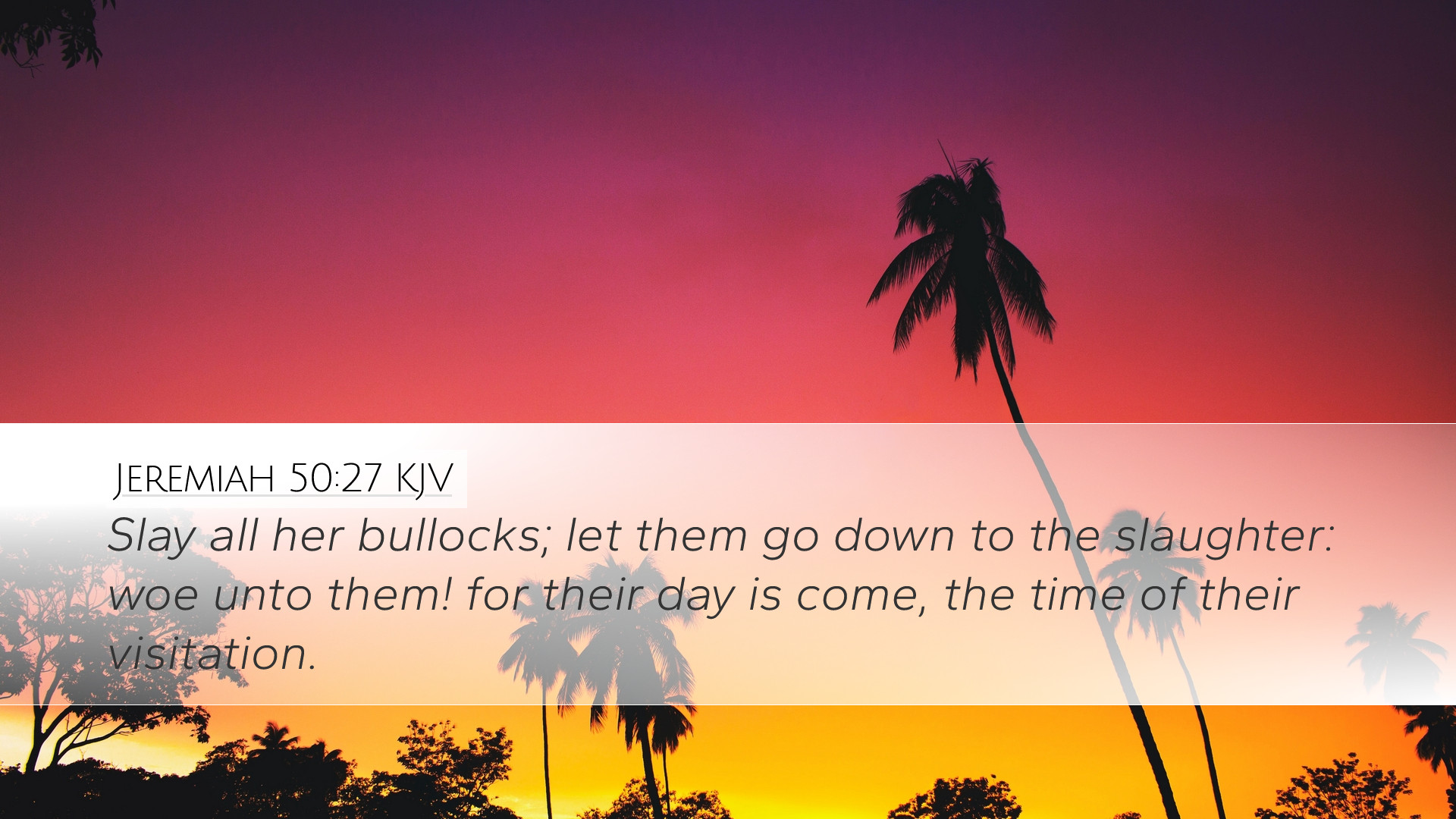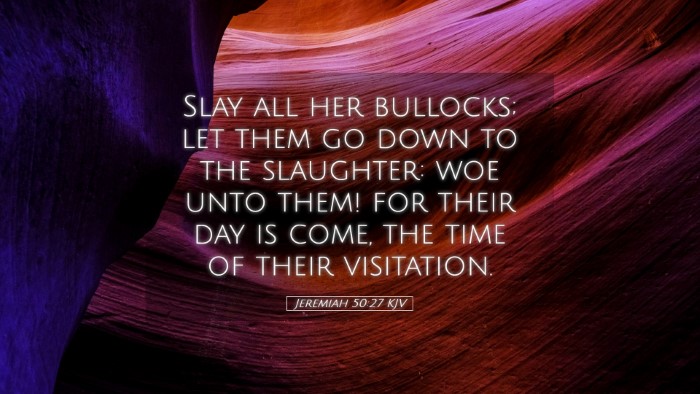Commentary on Jeremiah 50:27
Verse Insight: Jeremiah 50:27 states, "Slay all her bullocks; let them go down to the slaughter: woe unto them! for their day is come, the time of their visitation."
Introduction
The context of this verse is deeply embedded in the prophetic judgment against Babylon, illustrating God’s divine retribution towards nations that have committed egregious sins against Him. The imagery of slaughter used here represents not only the coming destruction but also highlights the seriousness of God's judgment and the inevitability of divine accountability.
Contextual Background
The Book of Jeremiah is situated in a historical context where the Israelites are in exile, and Babylon serves primarily as their oppressor. Jeremiah, as a prophet, delivers messages of warning and hope, revealing God's sovereignty over nations. As we reach chapter 50, the focal point shifts towards Babylon and its impending doom. The references to bulls and slaughter point towards a system of sacrifice and judgment, conveying total destruction.
Theological Themes
- Divine Judgment: The verse conveys the theme of divine justice. The metaphor of slaying bullocks signifies not just loss but a complete eradication of Babylon's pride and strength.
- God’s Sovereignty: Throughout Jeremiah, it's evident that God governs the rise and fall of nations. Babylon's downfall is predetermined in God's plan, reflecting His absolute authority.
- Visitation: The term "time of their visitation" implies a moment of divine intervention. This is significant, as it suggests both accountability and the fulfillment of God's promises.
Commentary Insights
Matthew Henry's Commentary
Matthew Henry emphasizes the severity of the impending judgment. He interprets the slaughter of the bullocks as a metaphor for the rulers and powerful figures in Babylon, signaling that their time of reckoning has arrived. His analysis underscores the importance of recognizing the depths of sin a nation can reach, where even its leaders must face accountability. Henry points out the historical application of this passage, reminding readers that Babylon's tyranny is not merely a narrative but a grave warning of divine justice.
Albert Barnes' Notes
Albert Barnes focuses on the phrase "let them go down to the slaughter," suggesting a predetermined outcome. He highlights that the imagery signifies complete destruction, not just physical defeat but spiritual annihilation for Babylon, illustrating the consequences of their idolatry and sin. Barnes connects this verse to the overarching narrative of God’s judgment, declaring that no power can withstand God's will when the appointed time for reckoning arrives.
Adam Clarke's Commentary
Clarke reflects on the significance of “the time of their visitation.” He asserts that this divine visitation represents a period of divine adjudication, where God's patience culminates in decisive action. Clarke remarks that the bullocks’ sacrifice symbolizes divine retribution, indicating that Babylon’s wealth and opulence will be rendered useless. Their prosperity is likened to the riches gained through sinful means, which ultimately leads to their downfall.
Practical Applications
For pastors and theologians, Jeremiah 50:27 serves as a sobering reminder of the realities of divine judgment. It compels the church to uphold righteousness, emphasizing that all nations, including those positioned in power, are subject to God's ultimate authority.
- Call to Repentance: This verse offers impetus for self-examination and corporate repentance amongst believers. Nations and leaders must align with Biblical principles to avoid divine chastisement.
- Faith in God's Justice: Believers are encouraged to trust in God's timing and judgment. This should bring solace amid injustice, affirming that God eventually rights the wrongs and holds the wicked accountable.
- Encouragement to the Oppressed: For those who suffer under oppression, the message is clear: God sees and He will act according to His justice. This offers hope and courage to those who feel powerless.
Conclusion
Jeremiah 50:27 encapsulates the essence of divine judgment against a rebellious and idolatrous nation. The prophetic declaration serves as a reminder to all nations of the perils of turning away from God. With insights drawn from notable public domain commentaries, we see the multifaceted dimensions of this verse emerge. It calls for awareness, vigilance, and a deep commitment to uphold God’s righteousness in a world often swayed by power and sin. By reflecting on these insights, pastors, students, theologians, and scholars can better understand the consequences of national sin and the hope found within God’s redemptive promises.


